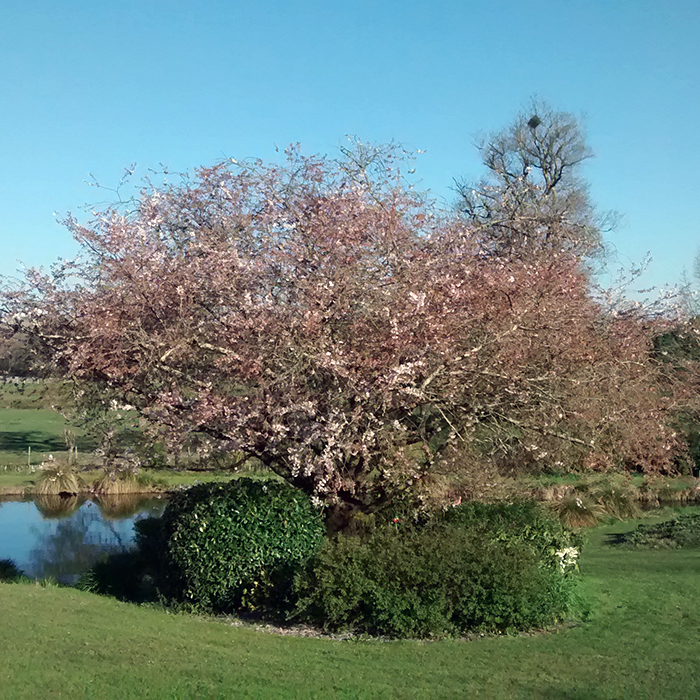Bordeaux’s climate: the impact of variability
Author: Oliver Barton

Spring blossom in Bordeaux
Bordeaux’s weather can be highly variable. For the Bordelais, this is a serious matter; it directly affects their revenue, and this doesn’t just apply to the winemakers.
The effects of climate in Bordeaux
In its position facing the Atlantic Ocean to the west, Bordeaux is unsurprisingly described as having an oceanic climate. Average temperatures during the year vary from 6˚C to 20˚C, and average rainfall is 931 millimetres per year. To put it in perspective, London’s average is 601 millimetres.
Bordeaux’s climate is characterised by a lot of wind and rain. The average temperature is tempered by the nearby ocean, resulting in cooler summers and warmer winters. That being said, the sun can be incredibly strong in those spots which are sheltered from the wind.
During the summer, highs of over 40˚C can be witnessed. This may be fantastic for those spending their days on the nearby beaches of Arcachon or Cap Ferret. Yet, in the vineyard, hours of sunshine can cause issues like dehydration and scorching problems.
In addition to this variable weather, both frost and hail can ruin a vigneron’s crop in a matter of hours. The vines are at their most sensitive during bud burst, which takes place in April. Here, a night or two of frost or a few bursts of aggressive hail can damage the buds which would have grown into fruit-bearing branches, devastating the year’s harvest.
The vine, once recovered, will grow secondary buds which will develop and carry fruit. Yet the yields and often the quality will be severely affected. The effects of these onslaughts are very hit-and-miss; your vineyard might be completely wiped out, but your neighbour’s plot just 20 meters down the road will stay unaffected.
The efforts of the growers
There are various techniques which growers will use to try and temper the impact of Bordeaux’s climate and frosts in particular, but these have mixed results, and can be incredibly costly.
Heaters, referred to in English as “Smudge Pots” can be spread among the rows to break up cold air pockets, but they don’t always have enough effect and a lot of labour is involved in keeping them running. Large fans are used to displace air, avoiding low cold air pockets on the ground. These can cover plots of up to 10 hectares and can pay for themselves with time, but they are a big investment to install.
In the most prestigious appellations one may well spot the odd helicopter gyrating above the vines to act much like a fan. Needless to say, these are a luxury, owned by only the wealthiest châteaux.
Organic growers such as the David Beaulieu family of Ch. Coutet in St Emilion argue that planting of trees around the vineyard can help temper the effects of frost. Another modern technique is sprinkler systems, which launch once a critical temperature is reached in the vineyard. Once again, installation is costly, and a huge amount of water is needed to run these.
Effects beyond the vineyards
In a region where 60% of business income is generated from the wine industry, it is easy to see how monitoring the weather could become an obsession for wineries. Yet, it doesn’t stop there. This income funds builders and agricultural workers brought in to do work on the estate. In good years, the wine workforce affects the prosperity of local businesses such as butchers, bakers, restaurateurs, etc.
In fact, there is not one line of business which isn’t affected by these market fluctuations and therefore everyone is watching the weather. The repercussions of a few bad harvests in a row will usually affect small wineries first, leaving only the big players to snap up their properties. Sadly, these vineyards will then too often be used in the production of bulk wine as an easily traded asset.
The good news is that generous harvests help see us through shortages caused by low crops in bad years. With Bordeaux sales heavily in growth this year in the UK market, Bordeaux-philes should look to keep their fingers crossed for as few extreme weather events as possible in future harvests.
Browse our full range of Bordeaux wines here.


